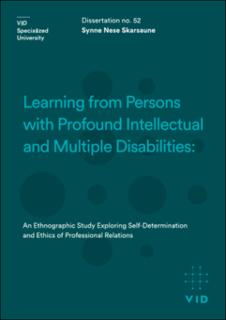| dc.description.abstract | Persons with profound intellectual and multiple disabilities (PIMD) are often excluded both from research and several areas of society. These people depend on others in all matters, relying on care that often involves professional services. There are challenges embedded in providing services for persons with PIMD, connected to embodied and dependent ways of being. For instance, abuse of power and ignorance can occur due to dependence on one from the other in the relationship, and also practices not ensuring the person’s value as a human being. One basic demonstration of humanity is the entitlement to human rights. This thesis puts a lens on the human right to experience self-determination, recognizing that this right is often violated in the case of persons with PIMD. An exploration of self-determination is seen as an adequate entrance to broader questions regarding professional practices and how they should be conducted in the context of persons with PIMD. To explore such issues, the person with PIMD should be included, with knowledge grounded in their perspectives. This thesis seeks to shed light on the overall question: What can we learn from persons with PIMD about self-determination and ethics in professional relations?
An ethnography was chosen as method, involving observations of three persons with PIMD interacting with their care professionals, and focusing on the professional relationship. The data material consists of close observations, with the use of filming in some delimited situations, and interviews with the professionals and family. This study method is informed by phenomenological intents to stay close to the first-person perspective, engaging with embodied communication; elements from sensory ethnography and infant observation have thus been useful. The theoretical framework applied when engaging with the data consists of three philosophers: Kittay, Lindemann, and Stein.
The thesis' three articles explore the case of self-determination from three angles: the theoretical, practical, and methodological. Starting out with a psychological understanding of self-determination as the congruence between behaviour and one’s preferences and values, the thesis suggests a theoretical rethinking of the concept, moving beyond the traditional understanding to involve independent choice-making. The ethnography suggests that self-determination unfolds within partnerships with the professional, engaging with self-determination as an ongoing process of being understood through one's embodied communication. Building upon this understanding, the thesis further explores how self-determination can be ensured and practiced within professional relations. It is suggested that, to facilitate another's self-determination, one must be able to hold that person in identity; this involves professionals being capable of holding the other. To hold another is suggested possible through professionals being enabled to grasp the person’s identity through embodied empathy and through involvement with the person. The thesis further explores how knowledge can be built in ways that value persons with PIMD as subjects of knowledge, exploring the possibilities in empathy. This is relevant both in the concrete case of ensuring self-determination but also, on a more general level, on how to include the perspective of persons with PIMD. It is argued that persons with PIMD hold competencies regarding embodied being and affective language, as well as ambiguous communication and dependency relations—all of which motivate the empathic process.
The thesis argues that self-determination must be understood as a profound and multiple phenomena, involving a broadening in understanding both on how meaning is communicated and understood and how the phenomenon is experienced. Self-determination can be communicated and understood through verbal and rational insights as well as through the embodied and non-rational, and can involve both independent choice-making and being understood within dependency relations. Such broadenings come with the implication that self-determination is made relevant for more people, including those dependent and portraying embodied ways of being. Further, it involves a messier concept, putting high demands on the professional, leading to a discussion on what can be learned from persons with PIMD about the ethics of professional relations. Departing from the ethnography, and moving into a dialogue with the theoretical framework, it is argued that ethics should be based on the particular and complex, rather than on the universal, and on notions of dependence and otherness, rather than independence, and the embodied and ambiguous rather than relying solely on the rational. As a contribution from this thesis, an ethics of holding is suggested as a way of meeting the comprehensive and demanding ethical task involved in caring for persons with PIMD—arguing for emotional holding, embodied holding, and holding-together. The thesis contributes with methodological attempts to move closer to the perspective of the person in question, applying methods sensitive to the epistemic resource of feelings when understanding the other. The study combines an optimistic understanding on the possibilities of relying on the immediate understanding of another's embodied communication, with sceptical notions of what is not understood. Suggestions through empathic understanding should not be taken for representing the ‘truth’, but hopefully it might motivate others to engage directly and learn from persons with PIMD. Such encounters can provide us with essentials relevant for understanding humanity.
Paper I: Skarsaune, S.N, Hanisch, H.M & Gjermestad, A. (2021). Self-Determination: What can we Learn from Persons with Profound Intellectual and Multiple Disabilities? Scandinavian Journal of Disability Research, 23(1), 317-32. https://doi.org/0.16993/sjdr.830
Paper II: Skarsaune, S.N. & Hanisch, H.M (2023). Holding and Professional Care – On Self-Determination for Persons with Profound Intellectual and Multiple Disabilities. Research and Practice for Persons with Severe Disabilities, 48 (1), 25-40. https://doi.org/10.1177/1540796923115357
Paper III: Skarsaune, S. N. (2023b) Persons with Profound Intellectual and Multiple Disabilities as Subjects of Knowledge – Exploring the Possibilities of Empathy (Manuscript submitted for publication). In review | en_US |
